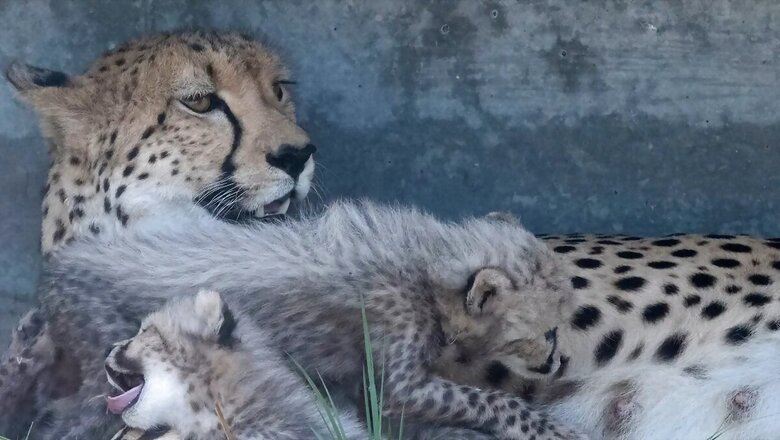
views
The death toll of cheetahs at Madhya Pradesh’s Kuno National Park continues to mount. Just two days after forest officials confirmed a newborn cub had perished, they have announced the deaths of two more, while a third remains critical.
India has so far lost six cheetahs since it conducted the historic translocation exercise of cheetahs from Namibia and South Africa in September last year. The big cats classified as endangered wildlife species were brought to India as part of Project Cheetah – a grand experiment to revive its population in the country.
Out of the total six, three were adults aged above four years, while the cubs were just two months old. They were born to a female Namibian cheetah translocated to India last September who was released into an enclosure in the national park by Prime Minister Narendra Modi. The cubs were born on March 29.
WEAK AND DEHYDRATED
According to the forest officials, all the cubs were “weak and dehydrated”, and the intense summer conditions seemed to have taken a toll on them. In a statement, the department says all the three cubs and mother cheetah were being closely monitored after the death of the first cub on Tuesday.
“Mother Cheetah ‘Jwala’ was given supplement food during the day. However, late afternoon, the condition of the cubs was not found to be normal. They were moved to a rescue centre due to intense heat, however, two of them died. The third one is critical,” read the statement.
The condition of the mother cheetah is so far “normal”. It was the first time that the female big cat had given birth.
The forest department had earlier invoked the evolution theory of ‘Survival of the Fittest’ for the death of the first cub. However, this time, it says that the intense heat on May 23 could be behind the tragic death.
“23 May was one of the hottest days for the region, with temperatures hovering above 46-47℃, and hot winds (loo) prevailing in the area. All the cubs were weak and severely dehydrated. They had just begun to move with their mother about 8-10 days ago,” said the forest department
SIX DEATHS IN TWO MONTHS
Questions now loom large over one of the world’s biggest such translocation projects, as wildlife conservationists flag concerns. Could these deaths have been avoided? Are African animals struggling to adapt to the new environment? The science behind the conservation measure is debatable.
Prolonged captivity has proved to be a serious cause of concern as it may have put additional stress on the animals. Experts from India and South Africa that News18 spoke to earlier agreed that the long quarantine period was “far from ideal”.
Within a year of this historic translocation, three adult cheetahs have died: one due to pre-existing kidney ailment and another because of a cardio-pulmonary failure. The third death of a female cheetah was attributed to a violent interaction between the big cats during courtship while they were still within the enclosures. This was followed by the death of three cubs this week.
However, the forest department takes refuge in the data which says that the survival rate of cheetah cubs in the wild in African countries is just 10%. This means that only one out of every ten cubs survives. But it is to be noted that all the four cubs were born in enclosures and the mother cheetah was yet to be released into the wild.















Comments
0 comment